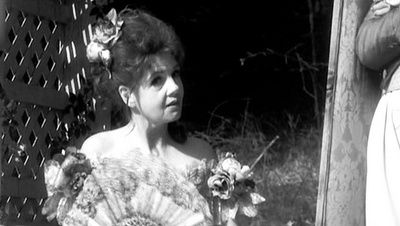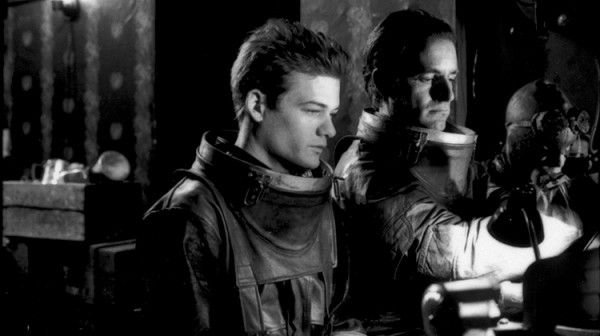[Editor’s Note: Welcome to Stream This, our weekly feature where we single out television programs and movies of considerable merit that are available on Netflix, Hulu, Amazon, Crackle, or other streaming services. Look for a new recommendation from Stream This every week.]
2001's The American Astronaut blasts off with one of the most lunatic plots you've ever heard of, beginning with writer-director-star Cory McAbee's portrayal of Samuel Curtis, an adventurous rapscallion who pilots around the solar system looking for odd jobs. As the film begins, he's dropping a cat off to a bar owner on Mars, who pays him with the ingredients to make a woman, a rarity considering that the women of the universe only populate Venus now. In conference with the Blueberry Pirate (Joshua Taylor), who runs the fresh fruit business amongst the planets, Samuel decides to trade his bounty for the use of The Boy Who Actually Saw a Woman's Breast (Gregory Russell Cook), an entertainer on Jupiter, in the hopes of electing him to become the new King of Venus. This, naturally, is due to the fact that the old King of Venus is dead and his body could make the Blueberry Pirate and Samuel rich, if they can outpace Professor Hess (Rocco Sisto), a vexed psychopath who kills anyone who knows Samuel over some vague slight. And that's not even getting into the musical numbers.
Despite it's unwieldy plot and its on-a-budget production design, McAbee's film boasts a heady pedigree of influences, beginning with Chris Marker's La Jetee while also suggesting the odd lovechild of silent Fritz Lang and John Ford. The latter influence is distinctly important, as the core of the film is about the insecurity and final desolation of modern masculinity: the entire script hinges on a world where procreation between the sexes is limited to one man, the aforementioned King of Venus. The desperation and loneliness that stricken these men in the absence of women is palpable in each black-and-white frame of the film, and such feelings tip into menace, violence, and murder. Professor Hess, for instance, eradicates an entire audience of workers, only to then throw a party by rolling around in their ashes. Earlier, the entire, cynical brood at the Mars bar gather into a fervor over a viscerally angry rock tune, until the Blueberry Pirate and Samuel do a dance routine for the audience's entertainment.
The world that's left is a wreck but not without its entertainments and joys, which includes aforementioned dances and, even more so, singing. This, again, recalls the sudden songs that Western heroes and barmaids would break out into in the 1940s and 50s, but here, the songs are more brash, vulgar, and borderline nonsensical; one song references a "pussy made of glass." McAbee's rollicking vision is heavy on invention and low on refinement, and yet his sense of framing often shows a distinct vision of crowded space, men cramped together or lost in the silent abyss of intergalactic travel. An early gag even has two men dancing and singing a song while trying to break down a stall door while Samuel is going to the bathroom. The American Astronaut sees the future of mankind as an similarly ugly, anarchic proposition as several other science fiction jaunts, even as space travel opens up possibilities for humans, but McAbee makes certain to root out the joy in such a manic and maddened world.
The American Astronaut is currently streaming on Hulu.



